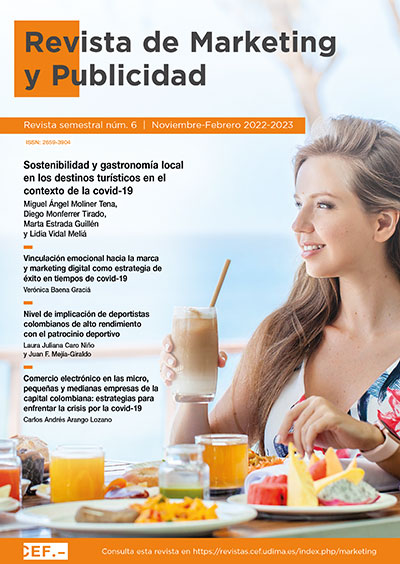Sostenibilidad y gastronomía local en los destinos turísticos en el contexto de la covid-19
DOI:
https://doi.org/10.51302/marketing.2022.3493Palabras clave:
abogacía, covid-19, experiencia de servicio, experiencia segura, gastronomía local, satisfacción, sostenibilidad, turismoResumen
Este trabajo ha obtenido el 1.er Premio Estudios Financieros 2022 en la modalidad de Marketing y Publicidad.
Este estudio supone una contribución importante a la literatura de turismo al explorar la relación entre la sostenibilidad y la gastronomía local en los destinos turísticos dentro del marco conceptual de la investigación de servicios transformadores. Además, tras la pandemia de la covid-19, la experiencia segura se propone como una nueva dimensión en la escala de medición de experiencia de servicio EXQ para considerar la importancia de la seguridad en la salud. A través de un cuestionario a 1.433 turistas, se confirman todas las hipótesis planteadas, comprobándose así la sostenibilidad percibida, la gastronomía local y la experiencia de servicio como aspectos clave en la estrategia de cualquier destino turístico. En primer lugar, el estudio identifica que la sostenibilidad percibida es un factor determinante de la experiencia de servicio del turista en el destino. Los turistas consideran que la sostenibilidad es una parte intrínseca de la propuesta de valor del destino y valoran la experiencia local de gastronomía y servicio a través del filtro de la sostenibilidad. En segundo lugar, la percepción de la gastronomía local no solo afecta a la experiencia turística, sino que influye de manera decisiva en la sostenibilidad percibida. Finalmente, la experiencia de servicio de los turistas tiene un efecto positivo significativo en la satisfacción, lo que a su vez afecta de manera positiva a la abogacía. También se demuestra la importancia de la experiencia segura en la experiencia de servicio, lo cual supone una contribución a la literatura de turismo en el contexto de la covid-19.
Agencias de apoyo
Este trabajo ha sido financiado a través del proyecto AICO/2020/074 de la Generalitat Valenciana (España) para grupos de investigación consolidados
Descargas
Citas
Antón, C., Camarero, C. y Laguna, M. (2017). Towards a new approach of destination loyalty drivers: Satisfaction, visit intensity and tourist motivations. Current Issues in Tourism, 20(3), 238-260.
Armesto, X. A. y Gómez, B. (2006). Tourism and quality agro-food products: an opportunity for the Spanish countryside. Tijdschrift Voor Economische en Sociale Geografie, 97(2), 166- 177.
Becker, L. y Jaakkola, E. (2020). Customer experience: fundamental premises and implications for research. Journal of the Academy of Marketing Science, 48(4), 630-648.
Björk, P. y Kauppinen, H. (2017). Interested in eating and drinking? How food affects travel satisfaction and the overall holiday experience. Scandinavian Journal of Hospitality and Tourism, 17(1), 9-26.
Blocker, C. P. y Barrios, A. (2015). The transformative value of a service experience. Journal of Service Research, 18(3), 265-283.
Campos, A. C., Mendes, J., Valle, P. O. D. y Scott, N. (2018). Co-creation of tourist experiences: A literature review. Current Issues in Tourism, 21(4), 369-400.
Chen, C. M., Chen, S. H. y Lee, H. T. (2011). The destination competitiveness of Kinmen’s tourism industry: exploring the interrelationships between tourist perceptions, service performance, customer satisfaction and sustainable tourism. Journal of Sustainable Tourism, 19(2), 247- 264.
Cheng, L. y Liu, L. (2022). Exploring posttraumatic growth after the COVID-19 pandemic. Tourism Management, 90, 104474.
Domínguez, J. A. y González, T. (2017). Analysing stakeholders’ perceptions of golf-course-based tourism: A proposal for developing sustainable tourism projects. Tourism Management, 63, 135-143.
Field, J. M., Fotheringham, D., Subramony, M., Gustafsson, A., Ostrom, A. L., Lemon, K. N., Huang, H. H. y McColl, J. R. (2021). Service research priorities: Designing sustainable service ecosystems. Journal of Service Research, 24(4), 462-479.
Fornell, C. y Larcker, D. F. (1981). Structural equation models with unobservable variables and measurement error: Algebra and statistics.
Friedrich, T. L., Byrne, C. L. y Mumford, M. D. (2009). Methodological and theoretical considerations in survey research. The Leadership Quarterly, 20(2), 57-60.
Fullerton, G. (2011). Creating advocates: The roles of satisfaction, trust and commitment. Journal of Retailing and Consumer Services, 18(1), 92-100.
Galeone, A. y Sebastiani, R. (2021). Transformative service research in hospitality. Tourism Management, 87, 104366.
Green, G. P. y Dougherty, M. L. (2008). Localizing linkages for food and tourism: Culinary tourism as a community development strategy. Community Development, 39(3), 148-158.
Hair, J. F., Black, W. C., Babin, B. J. y Anderson, R. E. (2010). Canonical correlation: A supplement to multivariate data analysis. En Multivariate Data Analysis: A Global Perspective. (7.ª ed.). Pearson Prentice Hall Publishing.
Hanna, P., Font, X., Scarles, C., Weeden, C. y Harrison, C. (2018). Tourist destination marketing: From sustainability myopia to memorable experiences. Journal of Destination Marketing & Management, 9, 36-43.
He, X., Cheng, J., Swanson, S. R., Su, L. y Hu, D. (2022). The effect of destination employee service quality on tourist environmentally responsible behavior: A moderated mediation model incorporating environmental commitment, destination social responsibility and motive attributions. Tourism Management, 90, 104470, 1-14.
Hill, S., Provost, F. y Volinsky, C. (2006). Network-based marketing: Identifying likely adopters via consumer networks. Statistical Science, 21(2), 256-276.
Jang, S., Kim, B. y Lee, S. (2022). Impact of corporate social (ir)responsibility on volume and valence of online employee reviews: Evidence from the tourism and hospitality industry. Tourism Management, 91, 104501, 1-11.
Jöreskog, K.G. y Sörbom, D. (1993). LISREL 8: Structural equation modeling with the SIMPLIS command language. Scientific Software International.
Kim, Y. G. y Eves, A. (2012). Construction and validation of a scale to measure tourist motivation to consume local food. Tourism Management, 33(6), 1458-1467.
Kim, Y. H., Kim, M., Goh, B. K. y Antun, J. M. (2011). The role of money: The impact on food tourists’ satisfaction and intention to revisit food events. Journal of Culinary Science & Technology, 9(2), 85-98.
Kivela, J. y Crotts, J. C. (2005). Gastronomy tourism: A meaningful travelmarket segment. Journal of Culinary Science & Technology, 4(2/3), 39-55.
Klaus, P., Edvardsson, B. y Maklan, S. (2012). Developing a typology of customer experience management practice - from preservers to vanguards. En 12th International Research Conference in Service Management. La Londe les Maures.
Lee, J. S., Hsu, L. T., Han, H. y Kim, Y. (2010). Understanding how consumers view green hotels: how a hotel’s green image can influence behavioural intentions. Journal of Sustainable Tourism, 18(7), 901-914.
Lemon, K. N. y Verhoef, P. C. (2016). Understanding customer experience throughout the customer journey. Journal of Marketing, 80(6), 69-96.
Lin, L. P. L. y Hsieh, W. K. (2022). Exploring how perceived resilience and restoration affected the wellbeing of Matsu pilgrims during COVID-19. Tourism Management, 90, 104473, 1-8.
Liu, C. H., Horng, J. S., Chou, S. F., Chen, Y. C., Lin, Y. C. y Zhu, Y. Q. (2016). An empirical examination of the form of relationship between sustainable tourism experiences and satisfaction. Asia Pacific Journal of Tourism Research, 21(7), 717-740.
MacKenzie, S. B. y Podsakoff, P. M. (2012). Common method bias in marketing: Causes, mechanisms, and procedural remedies. Journal of Retailing, 88(4), 542-555.
Maklan, S. y Klaus, P. (2011). Customer experience: are we measuring the right things? International Journal of Market Research, 3(6), 771-772.
Moliner, M. A., Monferrer, D. y Estrada, M. (2019). Customer engagement, non-transactional behaviors and experience in services: A study in the bank sector. International Journal of Bank Marketing, 37(3), 730-754.
OMT. (2022). Tourism and COVID-19: Guiding tourism’s recovery. https://www.unwto.org/es/turismo-covid-19
Podsakoff, P. M., MacKenzie, S. B., Lee, J. Y. y Podsakoff, N. P. (2003). Common method biases in behavioral research: a critical review of the literature and recommended remedies. Journal of Applied Psychology, 88(5), 879.
Richards, G. (2003). Gastronomy: an essential ingredient in tourism production and consumption? En Tourism and Gastronomy (pp. 17-34). Routledge.
Sánchez, R., Iniesta, M. Á. y Cervera, A. (2019). Exploring the concept of perceived sustainability at tourist destinations: A market segmentation approach. Journal of Travel & Tourism Marketing, 36(2), 176-190.
Shin, H., Nicolau, J. L., Kang, J., Sharma, A. y Lee, H. (2022). Travel decision determinants during and after COVID-19: The role of tourist trust, travel constraints, and attitudinal factors. Tourism Management, 88, 104428.
Sims, R. (2009). Food, place and authenticity: local food and the sustainable tourism experience. Journal of Sustainable Tourism, 17(3), 321-336.
Smit, B. y Melissen, F. (2018). Sustainable customer experience design: Co-creating experiences in events, tourism and hospitality. Routledge.
Smith, S. y Costello, C. (2009). Culinary tourism: Satisfaction with a culinary event utilizing importance-performance grid analysis. Journal of Vacation Marketing, 15(2), 99-110.
Steenkamp, J. B. E. y Van Trijp, H. C. (1991). The use of LISREL in validating marketing constructs. International Journal of Research in Marketing, 8(4), 283-299.
Stokburger-Sauer, N., Ratneshwar, S., y Sen, S. (2012). Drivers of consumer–brand identification. International Journal of Research in Marketing, 29(4), 406-418.
Suárez, M., Rubio, J. C., Pinto, J. y Gemar, G. (2018). A model to measure sustainable development in the hotel industry: A comparative study. Corporate Social Responsibility and Environmental Management, 25(5), 722-732.
Sun, W., Chen, W. T., Zhang, Q., Ma, S., Huang, F., Zhang, L. y Lu, H. (2021). Post-traumatic growth experiences among COVID-19 confirmed cases in China: A qualitative study. Clinical Nursing Research, 30(7), 1.079-1.087.
Torres, R. (2002). Toward a better understanding of tourism and agriculture linkages in the Yucatan: Tourist food consumption and preferences. Tourism Geographies, 4(3), 282-306.
Torres, A. y Palomeque, F. L. (2014). Measuring sustainable tourism at the municipal level. Annals of Tourism Research, 49, 122-137.
Vargo, S. L. y Lusch, R. F. (2008). Service-dominant logic: continuing the evolution. Journal of the Academy of Marketing Science, 36(1), 1-10.
Xu, Y. y Zeng, G. (2022). Not eating is a loss: How familiarity influences local food consumption. Tourism Management, 90, 104479.
Yoon, Y. y Uysal, M. (2005). An examination of the effects of motivation and satisfaction on destination loyalty: a structural model. Tourism Management, 26(1), 45-56.
Descargas
Publicado
Cómo citar
Número
Sección
Licencia
Derechos de autor 2022 Miguel Ángel Moliner Tena, Diego Monferrer Tirado, Marta Estrada Guillén, Lidia Vidal Meliá

Esta obra está bajo una licencia internacional Creative Commons Atribución-NoComercial-SinDerivadas 4.0.





















